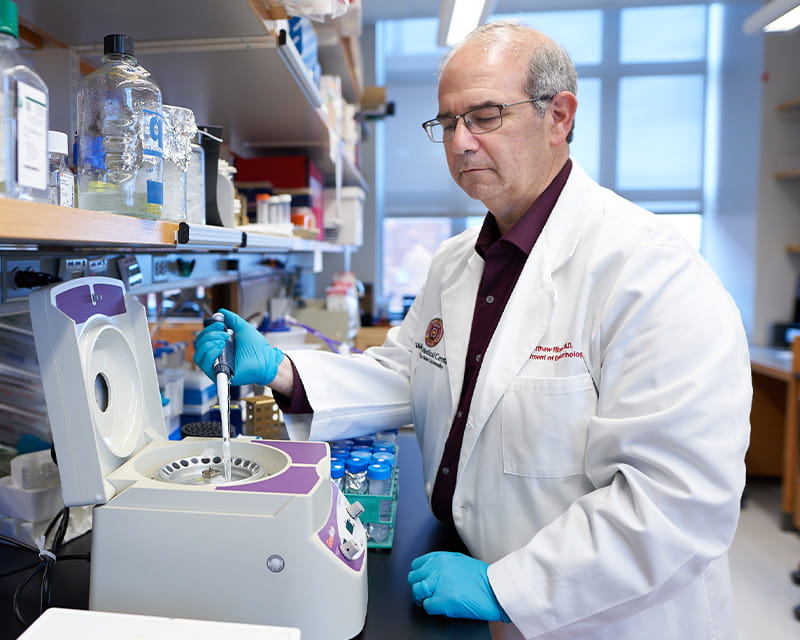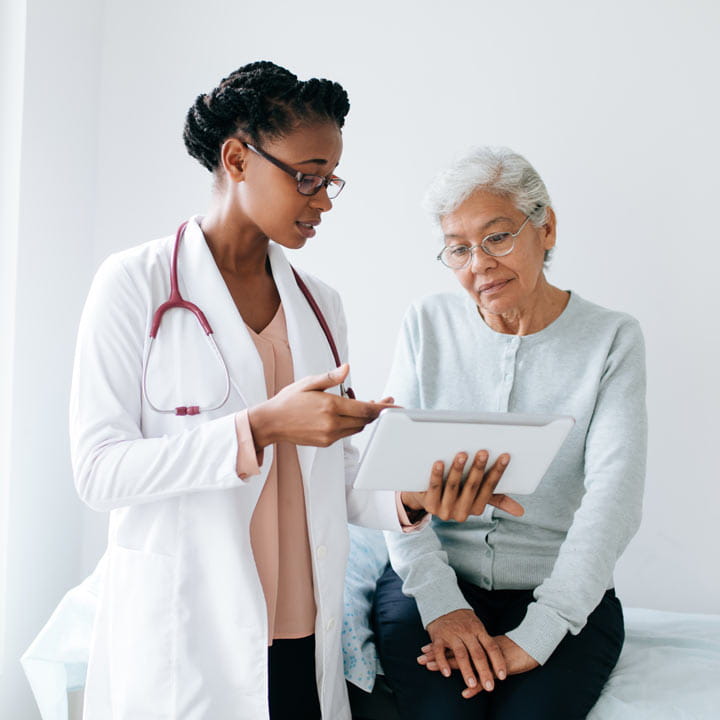
Studying “brake failure” in thyroid cancer metastasis
 Why it takes more than insulin for effective type 1 diabetes treatment
Why it takes more than insulin for effective type 1 diabetes treatment
“When partnering with a patient who has type 1 diabetes, we want to make sure we have a comprehensive range of services that is flexible enough to meet them where they are and support their overall wellness throughout their lifetime,” says Kathleen Dungan, MD, an Ohio State endocrinologist, associate director of Clinical Services and diabetes expert. “Because this is a chronic disease, there can be multiple points of vulnerability, whether that happens when they transition from pediatric to adult care, during pregnancy, while they are learning how to use a new insulin delivery device or manage new medications or even when they’re dealing with insurance denials or the financial reality of ongoing diabetes care. Whatever their struggles, we want to make sure we already have the systems in place to tackle them together, so that their diabetes management is always integrated into their daily life.”
To facilitate this robust partnership, each patient’s diabetes management team includes not only their primary endocrinologist and advanced practice providers (either a nurse practitioner or physician assistant), but may also include a patient technology navigator, social worker, nurses, dietitians or certified diabetes care and education specialists, pharmacists, ophthalmologists and other Ohio State specialists, including experts in transplant, weight management and even insurance authorization, all familiar with the unique challenges of type 1 diabetes.
The goal of Ohio State’s Multidisciplinary Type 1 Diabetes Program, which is led by endocrinologist Kathleen Wyne, MD, PhD, is to ensure consistent clinical care across a patient’s lifetime. To help accomplish this, some of the dedicated clinics and targeted services for patients with type 1 diabetes include:
The training programs provide patients with the knowledge and confidence needed to choose from the latest technologies, such as smart insulin pens, insulin pumps, continuous glucose monitoring devices and the newest automated insulin delivery systems. A technology navigator guides patients through approval processes, and certified educators provide the training and ongoing support needed for long-term success. This can include patient assistance while linking devices to the clinic for remote or virtual care, as well as linking and downloading a vast array of diabetes devices while at home or in clinic, so that the patient and provider can make timely treatment decisions together.
Following adoption of any new device, patients are always welcome to follow up with our multidisciplinary Device Clinic or attend follow-up classes to further their understanding of the mechanics, patterns and use of their diabetes management technology. We also offer a pharmacist-run remote monitoring program to ensure prompt contact with patients when their devices indicate a concerning change in glucose levels.
Young Adult Diabetes Program: To help patients transition to adult care, the Ohio State Wexner Medical Center and Nationwide Children’s Hospital developed this joint program. Led by Elizabeth Buschur, MD, the program supports patients as they learn to make independent health care decisions and encounter lifestyle choices that can impact their type 1 diabetes.
Diabetes in Pregnancy Program: This multidisciplinary program, also led by Dr. Buschur, provides joint treatment of both a patient’s type 1 diabetes and their unique prenatal needs. The program’s early diabetes education and management helps patients optimize their glycemic control to reduce risks, such as birth defects, miscarriage, preeclampsia and birth injuries, and also addresses the patient’s health after delivery.
Comprehensive Weight Management Program: Although weight isn’t always an issue with type 1 diabetes, Ohio State does offer both surgical and nonsurgical options to support healthy weight loss, including patient care from endocrinologist Benjamin O'Donnell, MD, as well as dietitians, exercise physiologists, certified health coaches, psychologists and, if needed, bariatric surgeons.
Retinal scanner: Ohio State has integrated retinal scanners into our diabetes specialty clinics to ensure more consistent, convenient patient screening for retinopathy. These scans are centrally read by an ophthalmologist who provides interpretation and care recommendations for patients with type 1 diabetes. This same ophthalmologist is then available for seamless referral when necessary.
Hospital Discharge Clinic: Noting that hospital admission rates are two to six times higher for patients with diabetes, and factors such as disease-related stress, health literacy and many social determinants of health contribute to higher 30-day readmission rates, Ohio State endocrinology specialists Kathleen Wyne, MD, PhD; Cara Harris, APRN-CNP; and Kelly Cephas Hill, APRN-CNP, wanted to measure the impact of Ohio State’s Hospital Discharge Clinic. In a published study with additional co-authors, they confirmed that our formal clinic approach has resulted in a statistically significant decrease in readmission 30 days post-discharge, reduced hospital expenses and improved patient adherence to preventive care.
Ohio State’s Diabetes and Metabolism Research Center (DMRC) studies facets of type 1 diabetes to understand why and how the disease affects individuals and to find new ways to treat and prevent it.
Included among DMRC research is a clinical trial funded by the Juvenile Diabetes Research Foundation (JDRF) to investigate the use of automated insulin delivery systems during pregnancy. With Dr. Buschur as Ohio State’s primary investigator, the Pregnancy Intervention with a Closed Loop System (PICLS) study is of critical importance, since current insulin delivery systems aren’t designed for the unique needs of pregnant patients with type 1 diabetes.
There’s also research from Eileen Faulds, PhD, MS, RN, who was awarded a JDRF-sponsored 2022 Tidepool Early Career Development Award to identify novel aspects of adolescent self-management and determine how diabetes distress and depression can impact it. Her efforts also include co-design of a simulation platform that allows patients to utilize diabetes technologies in a virtual environment to help improve their disease self-management. The resulting simulation app was developed using a team of nurses, endocrinologists, engineers and individuals with diabetes.
Dr. Faulds is also working with Dr. Dungan to find the most effective ways to implement continuous glucose monitoring in hospitalized patients during their stay and after discharge, and Dr. Buschur is conducting a study to investigate the safety and utility of these devices in hospitalized pregnant women both before and after labor and delivery. “We know that in the hospital, frequent fingerstick glucose monitoring can be uncomfortable for any patient with diabetes, and it can be time consuming for nurses,” Dr. Dungan says. “Our hope is that our research will prove the value of displaying a continuously measured glucose level on the same monitor as the heart rate and other vital signs.”
Referring physicians and patients can explore additional type 1 diabetes studies at Ohio State that are currently enrolling patients by visiting our StudySearch page and typing “type 1 diabetes” into the search box.
“Successful management of type 1 diabetes is ultimately determined by how much the patient understands about their disease and how motivated and prepared they are to follow the daily routine and insulin management required,” Dr. Dungan says. “This means we owe our patients an education platform that is comprehensive, responsive and accessible. In addition to the online options, we try to offer education opportunities at convenient locations across central Ohio during weekends and evenings, so that we’re available when people need us.”
In addition to the support found in our technology training programs and Device Clinic, Ohio State offers a range of inpatient and outpatient education opportunities, including group classes and one-on-one education resources, such as online information sessions, access to a registered dietitian, cooking classes and even community diabetes programs to share the latest information on prevention and treatment of diabetes.
With some medical conditions or diseases, the physician provides medication or performs a procedure and there’s little else required from the patient other than “following doctor’s orders” until they’re recovered. People with type 1 diabetes aren’t quite as fortunate.
“Insulin is just a small piece of the puzzle,” Dr. Dungan says. “It really takes a combination of clinical care, education and advanced research — along with lifelong partnership and support of the patient — to make a difference. When we work together, it just doesn’t get any better than that.”